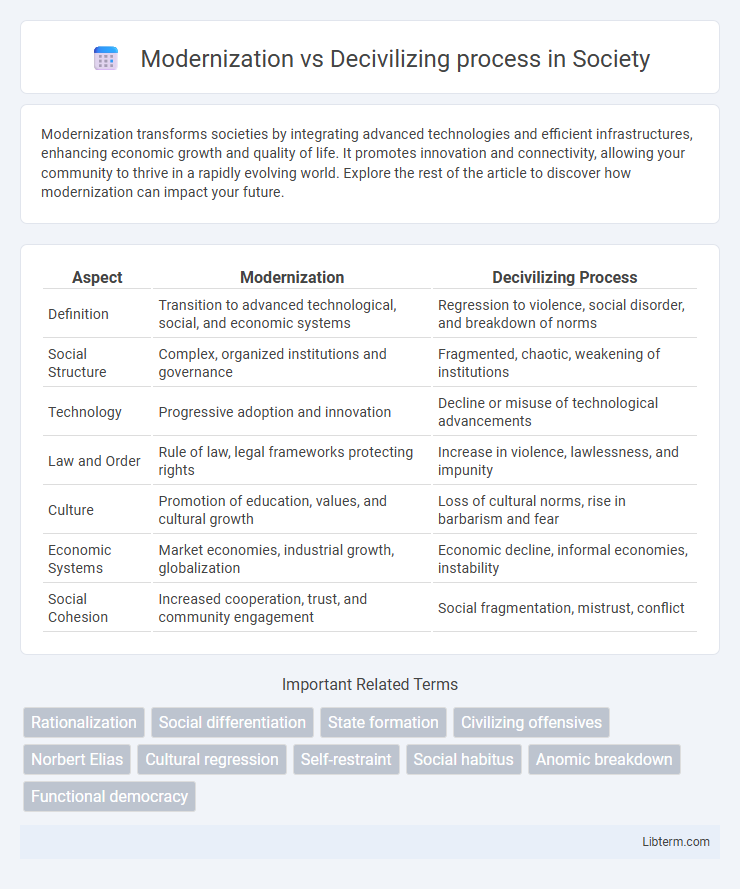Modernization transforms societies by integrating advanced technologies and efficient infrastructures, enhancing economic growth and quality of life. It promotes innovation and connectivity, allowing your community to thrive in a rapidly evolving world. Explore the rest of the article to discover how modernization can impact your future.
Table of Comparison
| Aspect | Modernization | Decivilizing Process |
|---|---|---|
| Definition | Transition to advanced technological, social, and economic systems | Regression to violence, social disorder, and breakdown of norms |
| Social Structure | Complex, organized institutions and governance | Fragmented, chaotic, weakening of institutions |
| Technology | Progressive adoption and innovation | Decline or misuse of technological advancements |
| Law and Order | Rule of law, legal frameworks protecting rights | Increase in violence, lawlessness, and impunity |
| Culture | Promotion of education, values, and cultural growth | Loss of cultural norms, rise in barbarism and fear |
| Economic Systems | Market economies, industrial growth, globalization | Economic decline, informal economies, instability |
| Social Cohesion | Increased cooperation, trust, and community engagement | Social fragmentation, mistrust, conflict |
Understanding Modernization: Definition and Key Features
Modernization refers to the transformative process through which societies transition from traditional to industrialized and technologically advanced states, characterized by urbanization, increased educational levels, and enhanced economic growth. Key features include the adoption of scientific reasoning, secular institutions, and democratic governance structures that promote individual autonomy and social mobility. Understanding modernization involves recognizing these systemic changes that foster innovation, integration into the global economy, and shifts in cultural values toward progress and rationality.
The Decivilizing Process: Concept and Implications
The decivilizing process, as conceptualized by Norbert Elias, refers to the reversal or breakdown of established social norms and civilizing behaviors that once regulated human conduct in complex societies. This process manifests through increased violence, social disorder, and weakened state control, challenging the progress made during modernization. Understanding the decivilizing process is crucial for analyzing contemporary issues such as urban crime, political instability, and cultural conflicts that undermine social cohesion.
Historical Roots of Modernization and Decivilization
The historical roots of modernization trace back to the Enlightenment and Industrial Revolution, emphasizing rationality, technological progress, and social reform as pathways to societal advancement. In contrast, the decivilizing process often refers to the breakdown of social norms and institutions, emerging during periods of war, colonial exploitation, or systemic crises that undermine established civil order. Both concepts engage with shifts in social structures, where modernization fosters organized complexity and decivilization reveals regression or chaos in cultural and political frameworks.
Drivers and Agents of Social Change
Modernization drives social change through technological advancements, economic development, and institutional reforms led by governments, corporations, and educational systems promoting increased urbanization and rationalization. In contrast, the decivilizing process is propelled by breakdowns in social norms, conflict, and power struggles, with agents including militant groups, authoritarian regimes, and societal elites exploiting fear and violence to undermine social cohesion. These opposing forces shape societal evolution by either fostering progress and integration or triggering fragmentation and instability.
Technology: Modernizing Force or Decivilizing Tool?
Technology serves as a modernizing force by driving innovation, improving communication, and enhancing productivity across societies, fostering progress and global interconnectedness. Conversely, it can act as a decivilizing tool by facilitating surveillance, spreading misinformation, and widening social inequalities, which undermine social cohesion and ethical norms. The dual impact of technology depends largely on governance, cultural context, and the ethical frameworks guiding its development and deployment.
Cultural Transformation in Modern Societies
Modernization drives cultural transformation by promoting technological advancement, urbanization, and shifts in social norms that emphasize individualism and rationality, reshaping identities and collective values in modern societies. The decivilizing process, conversely, reflects a regression into primal behaviors and social disintegration, often triggered by rapid changes that destabilize traditional cultural frameworks and erode established moral codes. Cultural transformation in modern societies thus oscillates between progressive adaptation through modernization and potential fragmentation seen in decivilizing trends, influencing the evolution of social cohesion and cultural identity.
Economic Progress vs. Social Fragmentation
Economic progress driven by modernization often leads to increased industrialization, urbanization, and technological advancement, which boosts productivity and wealth accumulation. However, this rapid economic growth can trigger social fragmentation, manifesting as weakened community bonds, rising inequality, and cultural disintegration. The tension between sustained economic development and maintaining social cohesion remains a critical challenge in contemporary societies.
Political Structures: Stabilization or Erosion?
Modernization often leads to the stabilization of political structures by promoting institutional development, rule of law, and bureaucratic efficiency, which enhance governance and social order. In contrast, the decivilizing process can erode political frameworks through rising violence, weakened state authority, and the breakdown of legal norms, resulting in political instability and fragmentation. The tension between these dynamics determines whether a society experiences governance consolidation or systemic erosion.
The Role of Globalization in Modernization and Decivilization
Globalization accelerates modernization by promoting technological innovation, economic integration, and cultural exchange, fostering advancements in infrastructure, governance, and social mobility. However, it can simultaneously trigger decivilizing processes through cultural homogenization, social fragmentation, and economic disparities that undermine traditional institutions and social cohesion. The dual impact of globalization highlights the complex interplay between progress and social disruption within modern societies.
Balancing Progress: Towards Sustainable Social Development
Modernization drives technological advancement and economic growth, while the decivilizing process highlights social fragmentation and cultural erosion. Balancing progress requires integrating sustainable development practices that respect cultural identities and promote social cohesion. Emphasizing inclusive policies and community engagement fosters resilience and equitable growth in rapidly changing societies.
Modernization Infographic

 libterm.com
libterm.com